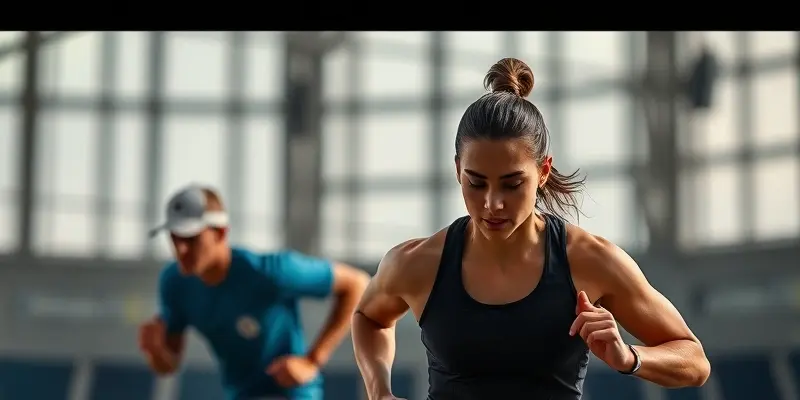In the realm of sports and fitness, injury prevention, effective recovery strategies, proper nutrition, and psychological resilience are essential elements for maintaining peak performance and wellness. Whether you’re a beginner embarking on a fitness journey or an experienced athlete striving for excellence, understanding these core principles can significantly impact your overall well-being and athletic success. Let’s delve into a structured approach to injury prevention, recovery, and performance optimization tailored to individuals at all levels of fitness.
Injury Prevention Strategies
Warm-Up and Cool-Down
Before engaging in any physical activity, prioritize dynamic stretching to enhance flexibility and reduce muscle stiffness. Post-activity static stretching aids in muscle recovery.
Strength Training
Building strength in key muscle groups, including the core, knees, ankles, and shoulders, provides essential joint stability and decreases the risk of injuries.
Technique and Posture
Maintaining proper form during exercise is crucial to avoid strain and reduce the likelihood of injuries. Seek guidance from trainers or coaches for technique refinement.
Gradual Progression
Avoid sudden spikes in training intensity or duration. Adhere to the 10% rule by increasing training load gradually to prevent overuse injuries.
Protective Equipment
Wearing sport-specific, well-fitted gear such as helmets, pads, mouthguards, and braces is vital for safeguarding vulnerable areas, especially in contact sports.
Proper Footwear
Utilize footwear designed for your specific sport to ensure adequate support, cushioning, and traction, reducing the risk of sprains and stress fractures.
Balance and Functional Training
Incorporate balance and sport-specific skill exercises into your routine to enhance overall conditioning and reduce injury rates, particularly in the lower limbs.
Hydration and Rest
Maintain optimal hydration levels and incorporate rest days in your training regimen to facilitate muscle recovery and prevent burnout.
Most Frequent Sports Injuries: Causes and Prevention Tips
| Injury Type | Common Causes | Prevention Tips ||———————-|————————————–|——————————————|| Sprains (ankle, knee)| Sudden twists, poor footwear | Strengthen muscles, wear proper shoes || Strains (muscle) | Overstretching, poor warm-up | Dynamic stretching, gradual progression || Shin splints | Repetitive stress, overtraining | Gradual increase in activity, rest || Stress fractures | Overuse, inadequate recovery | Strength training, proper nutrition || Tendinitis | Repetitive motion, poor technique | Technique refinement, rest |
Recovery & Return to Training
R.I.C.E. Method
Rest, Ice, Compression, Elevation—effective for dealing with acute, mild injuries to reduce swelling and pain.
Physical Therapy
Structured rehabilitation exercises restore strength, flexibility, and functionality. Seek professional guidance for persistent issues.
Pain Management
Utilize modalities like heat, cold, or over-the-counter medications under professional supervision as needed for pain relief.
Gradual Return
After an injury, reintroduce activity gradually, monitoring for any discomfort or pain. Patience is key to a safe and effective return to training.
Pre-Season Conditioning
Maintain fitness levels during off-season periods to minimize injury risk upon resuming play or training.
Heal Faster with This Injury Recovery Checklist
Nutrition for Faster Healing
- Protein-Rich Foods: Lean meats, dairy, legumes, eggs to support muscle repair and growth.
- Anti-Inflammatory Nutrients: Omega-3s, antioxidants, turmeric to reduce inflammation.
- Hydration: Essential for tissue repair and overall recovery.
- Micronutrients: Vitamins C and E, zinc, magnesium to support collagen formation and tissue healing.
Tools & Gadgets for Muscle Repair
- Foam Rollers & Massage Guns: Aid in myofascial release, reducing muscle tightness and enhancing recovery.
- Compression Gear: Sleeves and socks for improved circulation and reduced swelling post-activity.
- Wearable Tech: Smartwatches, fitness trackers for monitoring heart rate, recovery metrics, and avoiding overtraining.
- Cold Therapy Devices: Ice baths, cryotherapy to reduce inflammation and expedite recovery after intense training sessions.
Psychological Strategies During Rehabilitation
- Goal Setting: Establish realistic, incremental goals to maintain motivation during recovery.
- Mindfulness & Visualization: Utilize techniques like meditation, mental rehearsal to reduce anxiety and enhance focus.
- Social Support: Engage with coaches, teammates, support groups for motivation and accountability.
- Positive Self-Talk: Celebrate progress, victories, and build resilience through positive reinforcement.
Beginner-Friendly Recovery Guide
- Start Slow: Begin with low-intensity activities and gradually increase intensity.
- Listen to Your Body: Stop if experiencing sharp pain; mild discomfort is normal.
- Follow a Routine: Include warm-up, strength, flexibility, cool-down in every session.
- Seek Guidance: Consult professionals for personalized advice.
- Stay Consistent: Regular, balanced training leads to sustainable long-term results.
In summary, effective sports logistics encompass injury prevention, optimal recovery, nutrition, tech integration, and psychological resilience. By adopting a comprehensive approach, prioritizing well-being, and seeking professional guidance when needed, individuals can enhance their athletic performance and longevity in the fitness realm. Stay strong, stay resilient, and enjoy the journey to a healthier, fitter you.
[Previous Blog Posts]:[{“row_number”:2,”Title”:”Heal Faster with This Injury Recovery Checklist”,”SEO keyword”:”injury recovery checklist”,”URL “:”https://gympulse.club/injury-recovery-checklist-guide/”,”Summary of the content”:””},{“row_number”:3,”Title”:”Unlock Faster Recovery with Visualization for Healing”,”SEO keyword”:”visualization for healing”,”URL “:”https://gympulse.club/visualization-for-healing-guide/”,”Summary of the content”:””},{“row_number”:4,”Title”:”Phosphatidylserine: The Recovery Edge for Athletes and Fitness Enthusiasts”,”SEO keyword”:”phosphatidylserine for recovery”,”URL “:”https://gympulse.club/phosphatidylserine-for-recovery-benefits/”,”Summary of the content”:””}]

